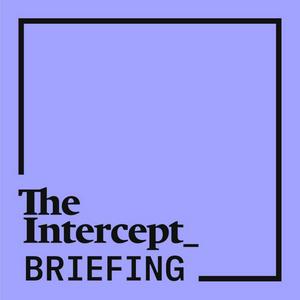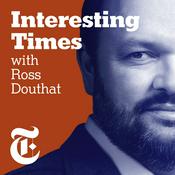381 odcinków
- The people of Iran are in the midst of one of the country’s biggest uprisings — and harshest government crackdowns — since the Iranian Revolution.
It started with shopkeepers in bazaars closing their doors at the end of December in protest of the plummeting Iranian rial and economic distress. But demonstrations soon spread to universities and across the country to every single province. Working-class Iranians wanted relief — both from the inflation crisis and U.S sanctions.
This week on The Intercept Briefing, host Akela Lacy speaks with Hooman Majd, an Iranian American writer and journalist, who explains what sparked the protests and the government’s brutal response.
“I don't think in the history of Iran, even during the Islamic Revolution, have we seen this number of fatalities.” says Majd. “The death toll is staggering. Really, because that death toll is staggering, what's happened is there are no more protests. And that's where we are right now. No more protest, heavy security on the streets. Massive security on the streets, on every corner. It isn't martial law. But it feels like martial law to people living there.”
The path forward is unclear, Majd says. But a few things are certain. “The idea is no to shah, no to an ayatollah, no to theocracy. Let's just, finally, after 120 years of demonstrating — which is what the Iranians have been doing since 1906 — after 120 years of looking for democracy, can we just do that? Can we just get a democracy? That is probably the biggest sentiment in Iran: wanting a democratic rule, wanting the repression to end, wanting better relations with the rest of the world so these sanctions can be lifted.”
Some people inside and outside Iran have called on President Donald Trump to intervene. The idea that the U.S. should — or could — impose regime change militarily is folly, Majd says. “Sure, we were able to impose a regime change in Iraq militarily. They can do that again in Iran, possibly with the help of Israel or even without the help of Israel. But then what do you have? Do you have another basically authoritarian, autocratic government?’”
Meanwhile, Trump has threatened to intervene in another international arena. He has set his sights on taking over Greenland.
Despite walking back his statements pledging to do so by force, Trump has now said he’s forming a plan with the secretary general of NATO for Greenland’s future. We’re joined by independent investigative journalist Lois Parshley, who explains the financial interests behind Trump’s obsession with the Arctic island, the billionaires and tech moguls plotting to exploit Greenland’s natural resources, and how the people of Greenland have responded to the president’s pledge to violate their sovereignty.
Shortly before Trump first expressed an interest in Greenland during his first term, his ambassador to Denmark and Greenland visited a major rare earth mining project on the island, Parshley reported last year.
“More recently, The Guardian reported that it was Ronald Lauder, heir to the global cosmetics brand [Estée Lauder] who was also a longtime friend of Trump's, who first suggested buying Greenland. He has acquired commercial holdings there and is also part of a consortium who want to access Ukrainian minerals.”
Fresh off the invasion of Venezuela, the idea that Trump wants to take over Greenland is even more alarming, Parshley says.
“I'm not the first person to report on these kinds of major tech interests in things like crypto states or special economic zones. People have been pointing this stuff out for a long time, but it's not until President Trump started saying the quiet part out loud that people have really been registering some of these absurd concepts that seem to now be creeping toward reality.”
Listen to the full conversation of The Intercept Briefing on Apple Podcasts, Spotify, or wherever you listen.
If you want to support our work, you can go to theintercept.com/join.
Hosted on Acast. See acast.com/privacy for more information. - Immigration and Customs Enforcement agent Jonathan Ross fatally shot Renee Good, a 37-year-old mother of three, in Minneapolis last week, unleashing a wave of anti-ICE protests and sentiment throughout Minnesota and the rest of the United States.
On Wednesday evening, federal immigration agents shot and wounded a man in Minneapolis, adding to the tension in the Twin Cities. President Donald Trump threatened to send in troops to crush the unrest.
“What should be very clear to all Americans now is that there is no way to wage war on ‘illegal immigration’ without also waging war on American citizens,” says Adam Serwer, staff writer at The Atlantic.
This week on The Intercept Briefing, host Jessica Washington examines how the Trump administration’s brutal deportation agenda is unfolding in Minnesota, sparking national backlash and renewed demands to abolish ICE; the historical legacy of immigration enforcement in the U.S.; and the administration’s racist vision of reshaping American society.
First, Minnesota Public Radio reporter Jon Collins shares an update on the Trump administration’s siege. “The national audience needs to understand this is not just unrest, this is not just protests. … This is an invasion,” says Collins. “The justification from this administration, the way that they’re portraying what's happening here in Minnesota — it almost turns on its head how we think about our constitutional rights in this country. Instead of protecting the citizens from the government, what they're arguing for is protecting law enforcement from any transparency, from any accountability to the people.”
“The biggest organization of terror in this moment is the Department of Homeland Security,” says Rep. Delia Ramirez, who shared exclusively with The Intercept that she is introducing legislation to limit the use of force by DHS agents.
The Illinois congresswoman described the bill as the “bare minimum” to curb DHS’s abuses, calling for Democrats to use the appropriations process to “hold” funding to the agency and ultimately dismantle it.
“Every single Democrat and every single Republican should be able to sign on to this bill,” says Ramirez. “Because it’s basic, bare minimum, and not signing on is indicating that you're OK with what's happening on the streets.”
“What we're seeing today has a long history,” says Adam Goodman, a historian at the University of Illinois Chicago. Federal immigration agencies’ budgets depend “on apprehensions, detentions, and deportations.” That “institutional imperative,” he says, “is going to lead to all kinds of problems, including incredible discretionary authority … and tremendous abuses.”
Serwer points out “the violence that you're seeing that federal agents are engaging in against observers, against activists, not just against immigrants, is a reflection of [an] ideological worldview. Which is that those of us who do not agree with Donald Trump are not real Americans and are not entitled to the rights that are due us in the Constitution, whether or not we have citizenship.” He adds, “The truth is, a democracy cannot exist when it has an armed uniformed federal agency who believes that its job is to brutalize 50 percent of the country.”
Listen to the full conversation of The Intercept Briefing on Apple Podcasts, Spotify, or wherever you listen.
If you want to support our work, you can go to theintercept.com/join.
Hosted on Acast. See acast.com/privacy for more information. - How long will the United States claim control over Venezuela? “Only time will tell,” President Donald Trump told the New York Times on Wednesday — potentially years. U.S. troops invaded the country over the weekend, kidnapping President Nicolás Maduro and his wife, Cilia Flores. Maduro and Flores pleaded not guilty to narco-terrorism charges in New York on Monday. They now sit in a Brooklyn jail, awaiting trial.
Trump and administration officials have justified ousting Maduro by claiming it was consistent with the Monroe Doctrine — a doctrine that through the years “has been expanded into something like a universal police warrant that allows the United States to intervene,” says historian Greg Grandin. “Trump has redefined the Monroe Doctrine to mean, the Monroe is as a weapon that the United States can use in order to protect its interests wherever it wants, whenever it wants. So it's a substitute for liberal international law.”
This week on the Intercept Briefing, host Jessica Washington discusses the Trump administration’s attack on Venezuela, its larger aims of controlling the Western Hemisphere, and bringing Latin America to heel with Grandin, the author of numerous books, including most recently "America, América: A New History of the New World."
“There's an affiliation between the Monroe Doctrine and American First nationalism,” says Grandin. “They imagine United States sovereignty expanding well beyond its borders within its hemisphere.”
The administration’s vision is outlined in the National Security Strategy the White House released in December. “This is a strategy that announces that the Monroe Doctrine is back in the especially bellicose form. But what's also interesting, if you read further, the United States is not withdrawing from any of those old regions. … It's reserving the right to treat the rest of the world like it treats Latin America.”
Trump and administration officials — from Secretary of State Marco Rubio, a longtime advocate for Venezuelan and Cuban regime change, to White House chief of staff Stephen Miller — have threatened to expand military operations to Colombia, Mexico, and other Latin American countries that don’t fall in line. Maureen Tkacik, investigations editor at The American Prospect, who recently wrote a profile of Rubio headlined “The Narco-Terrorist Elite,” also joins the conversation to discuss the former Florida senator’s history and ambitions.
Tkacik points out that Rubio, a driving force behind Maduro’s ouster, represents a wing of the Republican Party fixated on battling nominally left leaders in the region. That mentality is at odds with a key faction of Trump’s base, who say they’re against foreign intervention because they think the government should keep its attention on U.S. soil.
Trump’s attack on Venezuela and fixation on so-called “narco-terrorists,” Tkacik says, “represent an attempt to reconcile these two poles — the Steve Bannon guys and the Marco Rubio neocons — that really have different definitions of America First.”
Listen to the full conversation of The Intercept Briefing on Apple Podcasts, Spotify, or wherever you listen.
If you want to support our work, you can go to theintercept.com/join.
Hosted on Acast. See acast.com/privacy for more information. - After OpenAI CEO Sam Altman launched ChatGPT in 2022, the race for dominance in the field of artificial intelligence hit warp speed. Silicon Valley has poured billions of dollars into developing AI, building data centers, and promising a future free from the chains of unfulfilling work across the globe.
But in “Empire of AI: Dreams and Nightmares in Sam Altman’s OpenAI,” tech reporter Karen Hao pulls back the curtain, unveiling the human and environmental cost of artificial intelligence and the colonial ambitions undergirding Silicon Valley's efforts to fuel the rise of AI.
This week on The Intercept Briefing, host Jessica Washington speaks to Hao about her book and the dawn of the AI empire. “Empires similarly consolidate a lot of economic might by exploiting extraordinary amounts of labor and not actually paying that labor sufficiently or at all,” says Hao. “So that's how they are able to amass wealth — because they're not actually distributing it.”
“The speed at which they're constructing the infrastructure for training and deploying their AI models” is what shocks Hao the most, as “this infrastructure is actually not technically necessary, and ... somehow the companies have effectively convinced the public and governments that it is. And therefore there's been a lot of complicity in allowing these companies to continue building these projects.”
“They have effectively been able to use this narrative of [artificial general intelligence] to accrue more capital, land, energy, water, data. They've been able to accrue more resources — and critical resources — than pretty much anyone in history,” Hao says, warning of "the complete aggressive and reckless” growth of AI infrastructure, but stresses that none of this is inevitable. “There is a very clear path for how to unlock the benefits of AI without accepting the colossal cost of it.”
Listen to the full conversation of The Intercept Briefing on Apple Podcasts, Spotify, or wherever you listen.
If you want to support our work, you can go to theintercept.com/join.
Hosted on Acast. See acast.com/privacy for more information. Collateral Damage - Airborne Imperialism: The Tragic Deaths of Veronica and Charity Bowers
26.12.2025 | 58 min.We're excited to share another episode of The Intercept’s new podcast Collateral Damage. The investigative series examines the half-century-long war on drugs, its enduring ripple effects, and the devastating consequences of building a massive war machine aimed at the public itself. Hosted by Radley Balko, an investigative journalist who has been covering the drug war and the criminal justice system for more than 20 years, each episode takes an in-depth look at someone who was unjustly killed in the drug war.
Veronica and Charity Bowers, a young Christian missionary and her daughter, are killed when the Peruvian Air Force shoots down a small passenger plane in 2001. The plane had been mistaken for a drug smuggling plane and was shot down as part of a joint anti-drug agreement between the CIA and the Colombian and Peruvian governments.
President Donald Trump has made the Bowers's deaths newly and urgently relevant since he began ordering the U.S. military to strike down alleged drug smuggling boats in the Caribbean and eastern Pacific Ocean in September 2025. By early November, the U.S. had launched a total of 17 strikes, killing at least 70 people, and those figures seem to grow almost by the day. The attacks are illegal under both U.S. and international law. The administration also provided no documentation of the alleged drug trafficking.
The attack on the Bowers family pierced the veil that obscures drug war foreign policy because of their nationality, skin color, and relatability. More than 20 years ago, House Oversight Committee hearing members Jan Schakowsky and Elijah Cummings demanded accountability after U.S. drug interdiction forces killed the Bowers. They demanded to know how such a mistake could happen, and how we could prevent the loss of innocent life going forward.
“The kind of action we saw in Peru … amounts to an extrajudicial killing,” said Schakowsky at the time. Cummings added, “The Peruvian shootdown policy would never be permitted as a domestic United States policy precisely because it goes against one of our most sacred, due process principles — namely, that all persons are presumed innocent until proven guilty.”
Now, a new administration openly celebrates summary execution of alleged drug smugglers without a hint of due process, and is now threatening to topple another government to prevent the U.S. from sating its appetite for illicit drugs.
The story of Veronica and Charity Bowers is a stark reminder of how aggressive drug policy is wasteful and futile, how we never seem to learn from past failures, and how the generations-long effort to stop people from getting high also — and necessarily — treats human lives as expendable.
Subscribe and listen to the full series on Apple Podcasts, Spotify, or wherever you listen.
Hosted on Acast. See acast.com/privacy for more information.
Więcej Wiadomości podcastów
Trendy w podcaście Wiadomości
O The Intercept Briefing
Cut through the noise with The Intercept’s reporters as they tackle the most urgent issues of the moment. The Briefing is a new weekly podcast delivering incisive political analysis and deep investigative reporting, hosted by The Intercept’s journalists and contributors including Jessica Washington, Akela Lacy, and Jordan Uhl. Hosted on Acast. See acast.com/privacy for more information.
Strona internetowa podcastuSłuchaj The Intercept Briefing, Gość Radia ZET i wielu innych podcastów z całego świata dzięki aplikacji radio.pl

Uzyskaj bezpłatną aplikację radio.pl
- Stacje i podcasty do zakładek
- Strumieniuj przez Wi-Fi lub Bluetooth
- Obsługuje Carplay & Android Auto
- Jeszcze więcej funkcjonalności
Uzyskaj bezpłatną aplikację radio.pl
- Stacje i podcasty do zakładek
- Strumieniuj przez Wi-Fi lub Bluetooth
- Obsługuje Carplay & Android Auto
- Jeszcze więcej funkcjonalności


The Intercept Briefing
Zeskanuj kod,
pobierz aplikację,
zacznij słuchać.
pobierz aplikację,
zacznij słuchać.








































